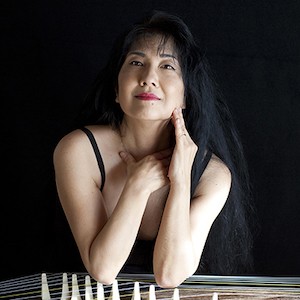Associate Professor Miya Masaoka Performs in Bang on a Can's Virtual 2021 Marathon Concert
Associate Professor Miya Masaoka was among the featured artists in this year’s virtual Bang on a Can Marathon Concert.
Masaoka is an American composer and sound artist whose work explores bodily perception of vibration, movement, and time, while foregrounding complex timbre relationships. In 2018, she joined the Columbia University School of the Arts as an Associate Professor, where she is the director of the Sound Art Program, a joint program with the Computer Music Center. A 2019 Studio Artist for the Park Avenue Armory, Masaoka has also received the Doris Duke Artist Award in 2013, a Fulbright Fellowship to Japan in 2016, and an Alpert Award in 2003. Her work has been presented at the Venice Biennale, MoMA PS1, Kunstmuseum Bonn, and the Park Avenue Armory. She has been commissioned by and collaborated with the BBC Scottish Symphony Orchestra, the Glasgow Choir, Jack Quartet, Del Sol, among many other renowned ensembles.
Masaoka was commissioned by Bang on a Can earlier on in her career, and the performance was a wonderful reunion. From its first iteration as a one-day New York-based marathon concert first held in 1987, Bang on a Can has evolved into “a multi-faceted performing arts organization with a broad range of year-round international activities.” At the heart of their organization is a dedication to innovative music, and their vast programming ranges from commissioning new composers, organizing performances, recording new work, developing new audiences, and educating future musicians.
“When we started Bang on a Can, we never imagined that our twelve-hour marathon festival of mostly unknown music would morph into a giant international organization dedicated to the support of experimental music, wherever we would find it,” writes Bang on a Can Co-Founders Michael Gordon, David Lang and Julia Wolfe. “But it has, and we are so gratified to be still hard at work, all these years later. The reason is really clear to us—we started this organization because we believed that making new music is a utopian act—that people needed to hear this music and they needed to hear it presented in the most persuasive way, with the best players, with the best programs, for the best listeners, in the best context. Our commitment to changing the environment for this music has kept us busy and growing, and we are not done yet.”
Partnering with MaerzMusik, the Berlin-based music festival, Bang on a Can returned to their roots to present a special virtual edition of their marathon concert, livestreaming four hours of live performances from both sides of the Atlantic, reflecting the diversity and breadth of their community. Masaoka performed a piece entitled “One String Thing Ding” for the festival’s virtual audience. The sole instrument Masaoka used in the piece, which she referred to as the grandchild of the larger koto she also plays, is a single-string instrument. “It’s almost the most reduced, basic kind of one-string or one-wire instrument that is possible,” Masaoka said in her interview with Gordon, Lang, and Wolfe. Masaoka also used synthesizers and oscillators in order to manipulate the sound of the instrument, using them to create and build texture. “The oscillators create these different tones, while the synthesizers create these different types of frequencies that filter the sounds. I hope it creates this organic sense of these kinds of frequencies and vibrations.”
Masaoka also touched on the deeper significance that’s embedded in these kinds of one-string instruments for her as an artist: “The gesture of plucking something from the air is such a primal, universal activity—the string is from bows and arrows from so many cultures, and it’s very much part of our long history as human beings. It makes sense that as a composer trying to find sounds from whatever the instrument is, squeezing out any potential timbres there are, that we follow a similar impulse.” Masaoka was one of the handful of featured artists currently residing in Berlin, the city where the MaerzMusik festival would have normally taken place. While the restrictions of the lockdown have certainly been limiting, Masaoka also shared how the interactions she’s been able to have with other collaborators during this time have been amplified as a result and filled with even more meaning.
“When I was commissioned in 1999 by Bang on a Can, it was such an important part of my life and my creative life.” Masaoka said. “I’m so appreciative that Bang on a Can continues to support me and my work.”
Watch Masaoka’s complete performance and brief interview with Bang on a Can Co-Founders Michael Gordon, David Lang, and Julia Wolfe on demand.
